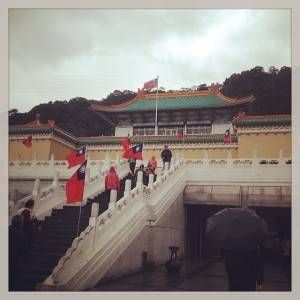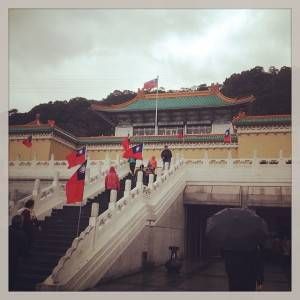
Cool Bookish Places: National Palace Museum, Taipei
I kicked off my winter vacation this year with a short trip to Taiwan. I had never been, and I didn’t research it too much before going. I spent most of the trip eating delicious food and taking long walks through the gorgeous city of Taipei or the old streets of Jiu Fen.

Among all the exhibits featuring various eras of ceramics, bronze, and jade sculpting, jewelry, weapons, and even collections of snuff bottles, there it was: Special Exhibition on the Art of Traditional Chinese Book Binding and Decoration (or, The Dao of Book Protection). This special book exhibit had serendipitously only been installed the day before I went to the museum, which is currently celebrating its 90th anniversary. It is, in a word, awesome. You get to see book binding techniques from before paper was even a thing, and books were composed on strips of bamboo or other woods, or on silk and rolled up. For a while, books were mounted and presented in the same ways paintings were, until paper became the standard medium.
It can be said that some modern book binding techniques developed from China, because it was when books were mounted on silk that leaving extra blank pages between the cover and text and protective covers and such, designed to protect the same text, emerged. Today we call them endpapers and dust jackets and other various terms, but they’ve existed since before paper was used to record text.
There are over 210,000 rare and antiquarian books sitting in the National Palace Museum, including an old copy of Lao Tzu’s Tao Te Ching. Most of the books in its collection came from the Qing Imperial Court (1644-1911; the museum was established in the ’20s), so there’s a great selection of both private publications and imperial editions, as well as copies of books which were written by Imperial order.
Unfortunately, I wasn’t able to get any pictures inside the museum itself, which is probably a good thing considering how crowded it gets. The book binding exhibit, however, was one of the easiest rooms for me to browse because people were focusing more of their time checking out the jade and ceramics. I was able to take my time and really look at all these old books I couldn’t read and see how well they’ve survived over time. China saw it all: bits of wood and bamboo strung together, long pieces of paper folded in like an accordion with writing mounted on each page, or rolled up like a scroll, and even sewing sheets of fabric (or later, paper) into a spine.
Another unfortunate note for me to report is this exhibition is only going to be at the National Palace Museum until June 28th, 2015. If you find yourself in Taipei sometime in the first half of this year, I can’t recommend the museum enough if you’re into such things. And not just because of the great look at the Chinese history of book binding- it’s a gorgeous museum which presents hundreds of years of history in an accessible way and in various languages. If you can’t make it but want to learn a little more about the history of book binding, you can read about it on the NPM’s website.
____________________
Follow us on Pinterest for drool-worthy covers, Book Fetish-y lit swag, bookish inspiration, and more!














